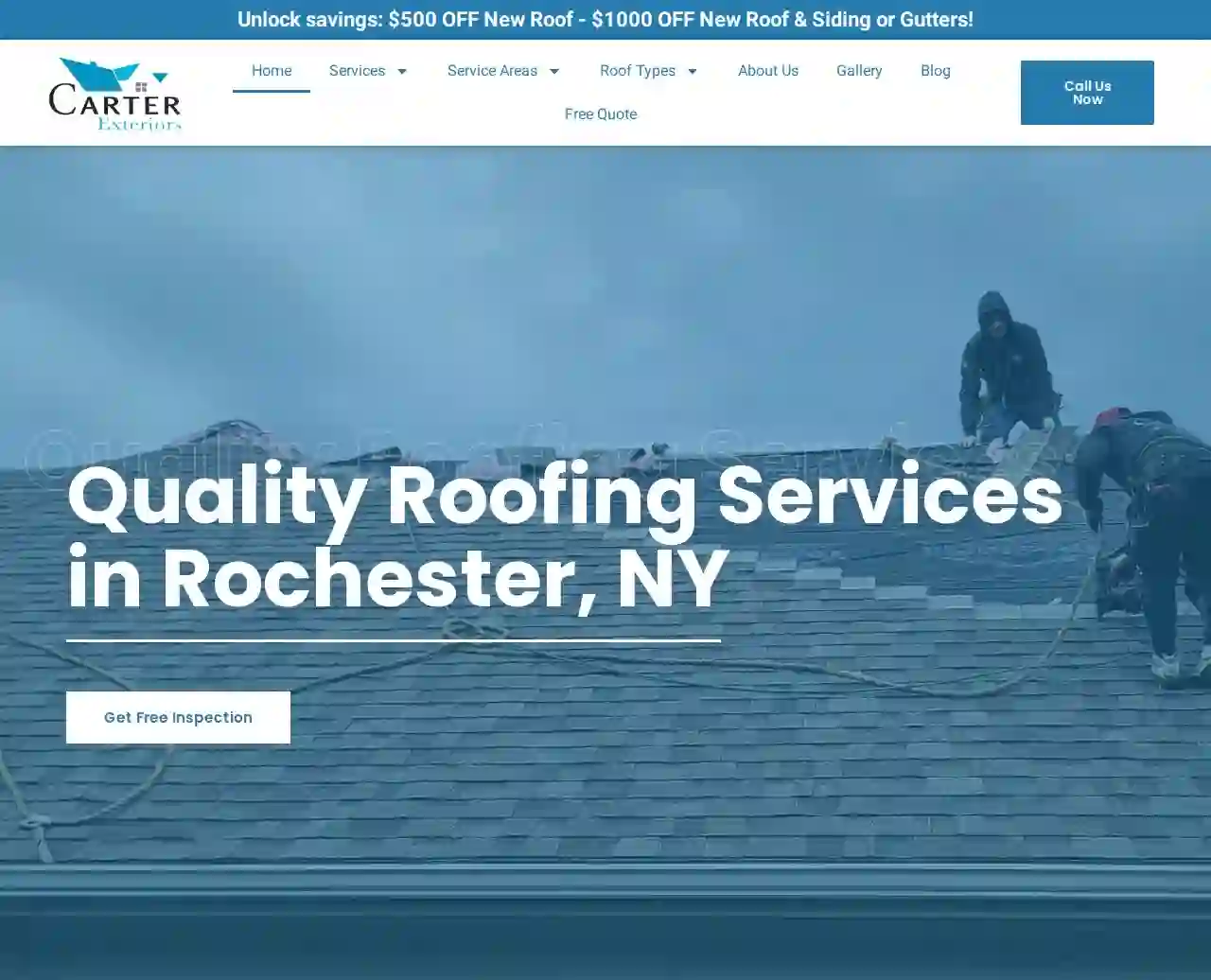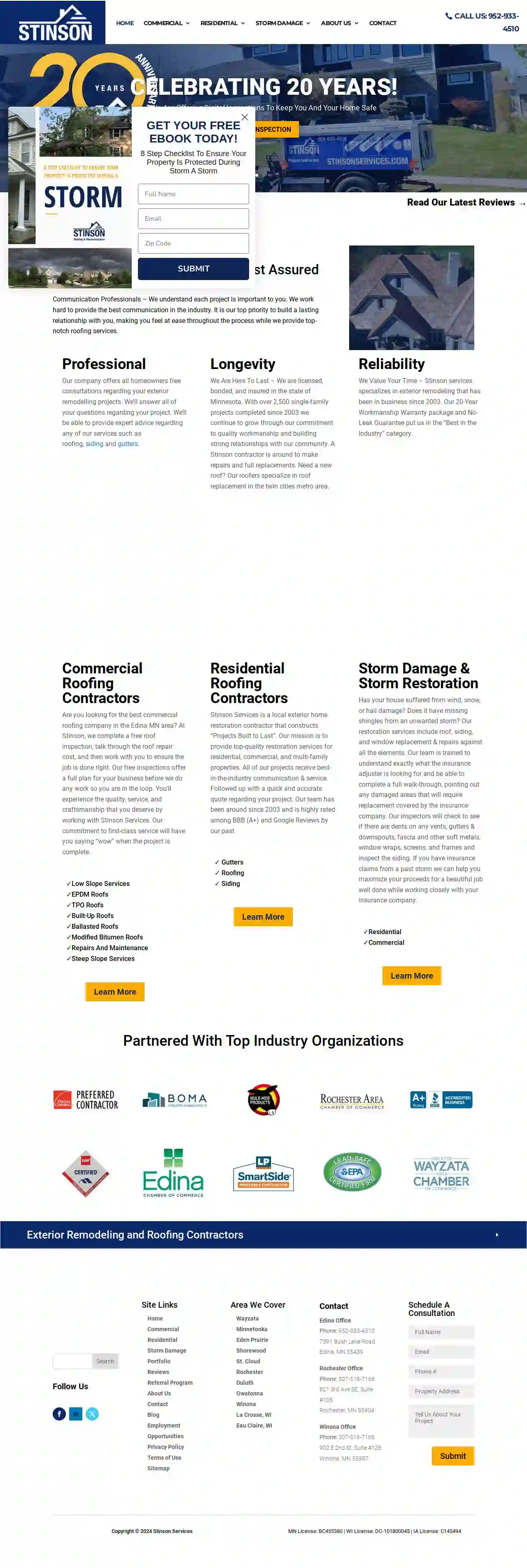Roofing Companies Apple Valley
Best Roofing Services in Apple Valley
Get multiple Roofing Company quotes for your project today! Compare profiles, reviews, accreditations, portfolio, etc... and choose the best offer.

Carter Roofing & Exteriors - Roofing Services
4.591 reviewsRochester, USWelcome to Carter Roofing and Exteriors, the trusted name for professional roofing services in Rochester, NY. We take pride in delivering top-notch roofing solutions while prioritizing your satisfaction. With our team of experienced contractors, both residential and commercial roofing needs are expertly met with professionalism and skill.
- Services
- Why Us?
- Gallery
Get Quote
Liberte Construction, LLC
4.5138 reviews1406 W. Lake St, Suite 202-203, Minneapolis, 55408, USLiberte Construction is a trusted roofing company serving Minneapolis and the surrounding communities. With over 15 years of experience, we specialize in residential, commercial, and multi-family roofing, as well as storm damage restoration. We are committed to providing high-quality workmanship, using only the best materials, and delivering exceptional customer service. Our team of experienced professionals is dedicated to exceeding your expectations and ensuring your complete satisfaction. Whether you need a new roof, repairs, or insurance claim assistance, Liberte Construction is here to help. We understand that your roof is one of the most important investments you can make in your property. That's why we take pride in our meticulous attention to detail and our commitment to using the latest roofing technologies and techniques. We offer a wide range of roofing services, including asphalt shingle, tile, slate, metal, single-ply, modified bitumen, stone-coated steel, and cedar shake roofing. We also specialize in hail and storm damage repair, fire and flood damage restoration, gutter installation and repair, siding installation, window replacement, and painting. At Liberte Construction, we are fully licensed and insured, and we stand behind our work with a 100% satisfaction guarantee. We are a member of the Better Business Bureau and have a proven track record of providing exceptional service to our clients. Contact us today for a free consultation and estimate.
- Services
- Why Us?
- Accreditations
- Gallery
Get Quote
All Around
5764 reviewsLong Lake, MN, 2265 Wayzata Blvd, 55356, USPremiere Minneapolis Exteriors, the aesthetics you want – the performance you need. Your locally-owned team of exterior construction experts. Making the choice of which contractor should improve or enhance your home can be one of the most important decisions a homeowner is faced with. The process is viewed as dreadful, daunting, and draining. All of us at All Around strive to create the most enjoyable experience ever for customers by providing a tested and proven process and delivers an experience that customers are proud to share with others. Our solid reputation is backed up by the quality of the projects we deliver.
- Services
- Why Us?
- Accreditations
- Our Team
- Testimonials
- Gallery
Get Quote
John A. Dalsin & Son, Inc.
4.512 reviews1000 S. La Brea Ave., Suite 200, Los Angeles, 90025, USDalsin is a leading provider of comprehensive fire protection and life safety solutions. With over 30 years of experience, we have built a reputation for excellence, reliability, and customer satisfaction. Our team of highly skilled technicians and engineers is dedicated to providing our clients with the highest quality service and support. We offer a wide range of services, including fire alarm installation, inspection, and maintenance; fire suppression system design, installation, and service; and emergency service and repair. Our commitment to safety is unwavering, and we strive to exceed industry standards in all that we do. At Dalsin, we understand the importance of protecting lives and property. We work closely with our clients to develop customized solutions that meet their specific needs and requirements. Our goal is to provide peace of mind knowing that their fire protection and life safety systems are in good hands. We are proud to serve a diverse clientele, including commercial, industrial, and residential customers. Our commitment to quality, service, and innovation has earned us the trust of our clients and the respect of our peers.
- Services
- Why Us?
- Gallery
Get Quote
New Life Contracting, Inc.
4.6138 reviewsSt. Paul, MN, 1898 Livingston Ave, 55108, USNew Life Contracting is a family-owned business that has been providing top-notch roofing, siding, and gutter services to the Twin Cities area since 1998. With a team of experienced professionals, we pride ourselves on our commitment to excellence, quality, and customer satisfaction. Our services include roof replacement, siding installation, gutter cleaning and repair, and storm damage restoration. We work closely with insurance companies to ensure a smooth and hassle-free process for our customers. Our team is dedicated to providing exceptional service, and we strive to build long-term relationships with our clients. Contact us today to schedule a free estimate and experience the New Life Contracting difference!
- Services
- Why Us?
- Accreditations
- Our Team
- Testimonials
- Gallery
Get Quote
Capital Construction
4.9820 reviewsBurnsville, MN, 501 W Travelers Trail, 55337, USSince the beginning, Capital Construction has been intentional with business practices, craftsmanship, and development. We do this in order to cultivate an environment for our people and communities to thrive. The final result is a best in class renovation experience for our client, with their most prized investment in mind - their home. We are There When You Need Us.
- Services
- Why Us?
- Our Team
- Testimonials
- Gallery
Get Quote
Stinson Services
4.8163 reviews7391 Bush Lake Road, Edina, 55439, USCelebrating 20 years of providing top-notch roofing services! We are a communication professional company that understands the importance of each project. We work hard to provide the best communication in the industry, building lasting relationships with our clients. Our company offers free consultations and inspections for residential and commercial roofing needs. We are licensed, bonded, and insured in Minnesota, with over 2,500 single-family projects completed since 2003. We specialize in exterior remodeling, offering a 20-year Workmanship Warranty and a No-Leak Guarantee. Our commitment to quality workmanship and building strong relationships with our community has earned us a reputation as one of the best in the industry.
- Services
- Why Us?
- Accreditations
- Gallery
Get Quote
Minneapolis Roofing Pros
Minneapolis, USWelcome to Minneapolis Roofing Pros – Your Trusted Roofing Solution For years, Minneapolis Roofing Pros has stood as the forefront expert among the Minneapolis Roofing Contractors specializing in exceptional roofing installations and repairs. Our unwavering commitment extends to both residential and commercial clients, making us the go-to choice for all your roofing needs. Backed by decades of experience, our dedicated team excels in a diverse array of materials, ensuring a perfect match for every budget. Whether you’re seeking storm damage repair, roof leak resolution, installations, or complete roof replacements, we have you covered. Our comprehensive services extend beyond just roofing, encompassing siding, window services, and addressing the aftermath of hail and storm damage. When you choose us, you’re selecting affordability combined with the reassurance of our exceptional service – a testament to our dedication to your complete satisfaction.
- Services
- Why Us?
- Accreditations
- Gallery
Get Quote
Sellers Roofing Company - New Brighton
4.839 reviews366 New Brighton Road, New Brighton, 55112, USAt Sellers Roofing Company- New Brighton, we provide top-quality roofing services tailored to meet the unique needs of homeowners in the Minneapolis and Saint Paul area. Our team of experienced professionals specializes in roof installations, repairs, and storm damage restoration. We are committed to delivering exceptional craftsmanship, superior customer service, and reliable results. Servicing New Brighton, Minneapolis, Saint Paul, Mounds View, Shoreview, Roseville With over 14 years of experience serving both residential and commercial clients in Minneapolis and Saint Paul we’ve earned a reputation as a dependable and trusted choice. Our commitment to competitive pricing combined with expert craftsmanship distinguishes us in the industry. At Sellers Roofing Company- New Brighton, we offer a diverse range of services tailored to meet both residential and commercial roofing needs. From new roof installations and repairs to addressing storm damage, our seasoned team consistently delivers exceptional results. But our expertise isn’t limited to roofing. We also provide remodeling and home improvement services designed to enhance both the functionality and aesthetics of your property. What truly sets us apart is our steadfast commitment to customer satisfaction. We place paramount importance on building and maintaining trust with every homeowner and business owner we engage with. By treating your property as if it were our own, we ensure meticulous attention to detail and use only the highest-quality materials. Choose Sellers Roofing Company- New Brighton for dependable service, unmatched craftsmanship, and unparalleled customer care. Reach out to us today to discuss your roofing and remodeling needs and discover the difference we can bring to your home or business.
- Services
- Why Us?
- Accreditations
- Gallery
Get Quote
Minnesota Valley Roofing & Restoration
514 reviews1251 W 82nd St, Chaska, 55318, USMinnesota Valley Roofing & Restoration is a leading roofing company in Chaska, MN. With more than 25 years of experience in the roofing industry, we serve residential and commercial clients and are a locally owned and operated company that is fully licensed and insured to handle all your roofing needs. We are BBB-accredited and offer high quality workmanship on all our projects. Call us today for a free quote on your roofing needs in Chaska, MN.
- Services
- Why Us?
- Testimonials
- Gallery
Get Quote
Over 17,196+ Roofers onboarded
Our roofing pros operate in Apple Valley & surroundings!
Roofyng.com has curated and vetted the Best Roofing Businesses arround Apple Valley. Find a trustworthy business today.
Frequently Asked Questions About Roofing Companies
- Experience: Companies with a solid track record and years of experience in the industry.
- Licensing and Insurance: Verify they are properly licensed to operate in your area and carry adequate insurance to protect you from liability.
- Certifications: Look for certifications from reputable organizations, demonstrating expertise in specific roofing materials or techniques.
- Positive Reviews: Check online reviews and testimonials from previous customers.
- Professionalism: Choose a company that communicates clearly, provides detailed estimates, and has a courteous and responsive team.
- Sagging or Pulling Away: Gutters that are sagging, pulling away from the house, or visibly damaged need repairs or replacement.
- Overflowing Water: If water overflows during rain, it indicates clogs or inadequate drainage.
- Visible Debris: Leaves, twigs, and other debris accumulated in the gutters obstruct water flow.
- Water Damage: Water stains or damage to siding or foundation near the gutters suggest overflow.
- Plant Growth: Plants or moss growing in the gutters indicate standing water and the need for cleaning.
How do I find a good roofing company?
What should I do with my old roof after replacement?
What is a roof valley, and why is it important?
How can I tell if my gutters need to be cleaned or repaired?
How do I find a good roofing company?
- Experience: Companies with a solid track record and years of experience in the industry.
- Licensing and Insurance: Verify they are properly licensed to operate in your area and carry adequate insurance to protect you from liability.
- Certifications: Look for certifications from reputable organizations, demonstrating expertise in specific roofing materials or techniques.
- Positive Reviews: Check online reviews and testimonials from previous customers.
- Professionalism: Choose a company that communicates clearly, provides detailed estimates, and has a courteous and responsive team.
What should I do with my old roof after replacement?
What is a roof valley, and why is it important?
How can I tell if my gutters need to be cleaned or repaired?
- Sagging or Pulling Away: Gutters that are sagging, pulling away from the house, or visibly damaged need repairs or replacement.
- Overflowing Water: If water overflows during rain, it indicates clogs or inadequate drainage.
- Visible Debris: Leaves, twigs, and other debris accumulated in the gutters obstruct water flow.
- Water Damage: Water stains or damage to siding or foundation near the gutters suggest overflow.
- Plant Growth: Plants or moss growing in the gutters indicate standing water and the need for cleaning.